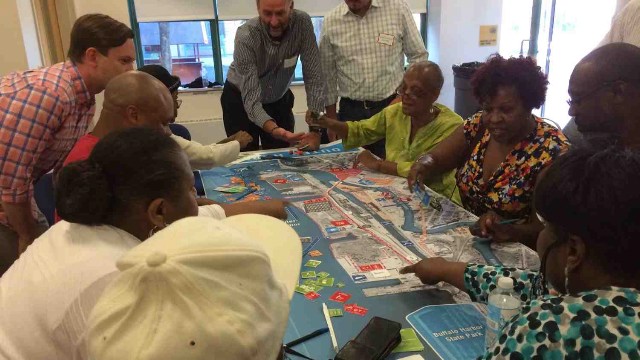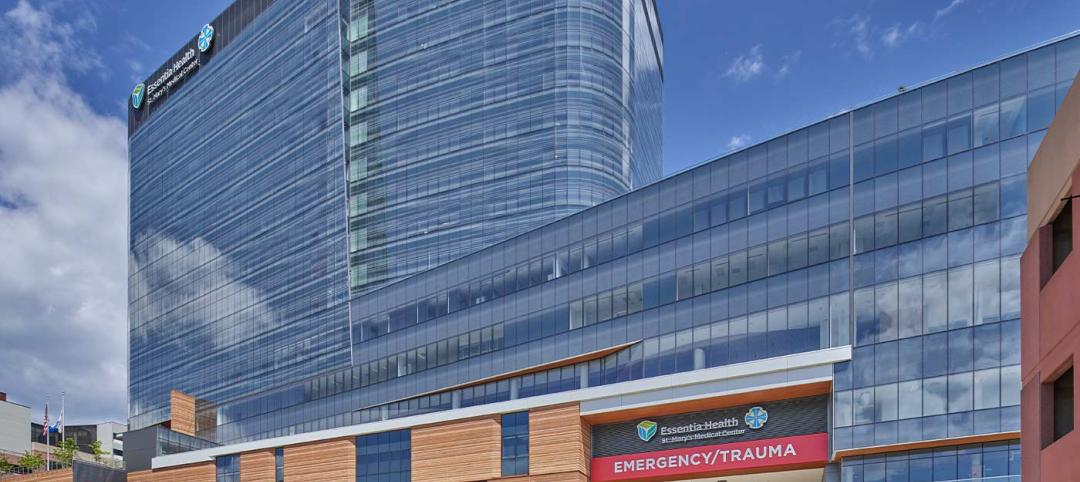Perkins+Will announced on Aug. 18 the firm’s latest planning wins and expanded business for its planning practice, with a focus on work for underserved neighborhoods and regions.
Led by global leaders Janice Barnes and Karen Alschuler, Perkins+Will has broadened its efforts with economic development groups, regional planning agencies, as well as transit agencies, healthcare providers, and mixed-use developers. The work is resulting in comprehensive, long-term plans that will guide new growth in places like Buffalo, N.Y., Kingston, R.I., and Brooklyn, N.Y.
“These new projects reflect Perkins+Will’s commitment to the many New York communities where serious need remains for improved community health and its supporting infrastructure, housing, health services, recreation, and transit,” says Barnes, PhD. “It’s all part of public- and private-sector efforts to knit together the very fabric of our cities, to reinforce and revitalize them, which can only happen through serious community engagement.”
Helping connect community leaders with planning agencies and such client groups as New York’s Economic Development Corp. (EDC), the Erie Canal Harbor Development Corp. (ECHDC), Wyckoff Heights Medical Center, and Community Care of Brooklyn PPS, Perkins+Will is taking a leadership role in shaping major waterfront redevelopment, urban revitalization, transit centers and health districts, says Barnes.
Principals include Barnes, who leads the firm’s Planning+Strategies group, along with: Karen Alschuler, who leads Urban Design; Robin Guenther, FAIA, a global leader in resilience and healthcare; and health district expert Jason Harper, AIA, who recently presented on health district planning in Toronto at the World Congress on Design & Health.
In addition, Perkins+Will has been selected as lead consultant for a number of significant planning commissions and related initiatives. Recently announced projects led by Perkins+Will include:
Buffalo
Perkins+Will has been selected to design a waterfront master plan in Buffalo, including the reuse and redevelopment of 171 acres of the outer Lake Erie harbor. The plan will reconnect downtown Buffalo with its waterfront and create a vibrant destination of community, commerce and culture. The client, ECHDC, is working with the firm’s New York and San Francisco offices on three development alternatives for the land, with significant community engagement and public participation. Led by Alschuler and Dennis Dornan, a senior planner in the firm’s urban design group, the result will be a complete land-use framework, including financial projections and an operations plan, to encourage active use of the outer harbor while enhancing public access and linking it to downtown and its Canalside district. Thomas Dee, the CEO of ECHDC, noted that Perkins+Will has a track record of successful experience with cold-weather waterfronts – in Ottawa and Toronto, among others.
The firm is also involved with projects that address legacy brownfield remediation to reimagine post-industrial sites, such as their new project in Kingston, N.Y. The firm’s senior planner, Amy Thompson, notes that this work reflects Perkins+Will’s long history of leadership in urban design and environmental stewardship nationally.
Health Districts
The firm is also working on a range of planning projects where the goal is to create a regional health district – a livable, walkable neighborhood that focuses on wellness, prevention and overall community health through network partnering and pooled resources. Perkins+Will’s Harper, who frequently lectures and publishes on the topic, has also worked to advance urban design and planning criteria for health districts with ULI, the Congress for New Urbanism, EcoDistricts, AIANY, the New York Academy of Medicine, and other groups. Harper, along with Basak Allen and David Green, advocates from both the grassroots and global perspective in his efforts to create healthier communities.
Brooklyn
One of those budding health districts may soon be in Brooklyn, where Barnes recently chaired a ULI workshop to spark new implementation strategies for a transit-oriented development (TOD) zone called Broadway Junction. Barnes and Harper, along with Daniel Windsor, senior urban planner at Perkins+Will, recently partnered with a panel of experts and community leaders to identify the short-, mid- and long-term “enabling projects” for the Broadway Junction community, The ULI New York's Technical Assistance Panel, or TAP, is a volunteer effort to provide urban planning strategies for targeted communities. The Broadway Junction community is within the catchment area of Wyckoff Heights Medical Center, where Perkins+Will is also at work assisting the medical center on the development of a strategy for a “health improvement district.”
The TAP will make recommendations to the New York City Department of City Planning as well as to local community board and nonprofits, “to incentivize large-scale and mixed-use development along key blocks … and create new employment, retail, and entertainment opportunities for surrounding residential communities,” says ULI New York. In parallel, and guided by Perkins+Will’s efforts, Wyckoff is identifying opportunities to partner with healthcare providers in the Broadway Junction community as well as in their larger catchment area, to increase access to healthcare services for this underserved area, which has some of the highest asthma and diabetes rates in the city.
Transit Oriented Developments of TODs (various locations)
In addition to Broadway Junction, Perkins+Will planners have been engaged for other large, mixed-use TOD plans in North America to spur economic revitalization in dozens of underserved communities. Recent TOD projects by the firm include the award-winning Treasure Island Master Plan + Urban Design project in San Francisco, the Beltline Corridor Design in Atlanta, and Station Park Green in San Mateo, Calif.
Resiliency (various locations)
Perkins+Will has worked with national, state and city leaders on regional plans and facility specific planning, design, and construction projects to identify and implements techniques for reducing climate- and weather-related risks to communities and the built environment. These planning and architecture projects examined how underserved communities can become more resilient to – and recover more swiftly from – the disastrous impacts of future severe weather events. Guenther, one of the firm’s experts on resilience, helps prepare health organizations for increased climate risks and severe weather. Guenther will speak on the topic at the conference“Building the Resilient City,” to be held Sept. 4-5 in San Francisco by the Urban Land Institute (ULI).
Related Stories
Healthcare Facilities | Dec 19, 2023
A new hospital in Duluth, Minn., is now the region’s largest healthcare facility
In Duluth, Minn., the new St. Mary’s Medical Center, designed by EwingCole, is now the largest healthcare facility in the region. The hospital consolidates Essentia Health’s healthcare services under one roof. At about 1 million sf spanning two city blocks, St. Mary’s overlooks Lake Superior, providing views on almost every floor of the world’s largest freshwater lake.
Government Buildings | Dec 19, 2023
New Pennsylvania State Archives building holds documents dating back to 1680
Work was recently completed on a new Pennsylvania State Archives building in Harrisburg, Penn. The HGA-designed, 146,000-sf facility offers numerous amenities, including computers, scanners, printers, a kitchenette with seating, lockers, a meeting room, a classroom, an interactive video wall, gallery, and all-gender restrooms. The features are all intended to provide a welcoming and comfortable environment for visitors.
Urban Planning | Dec 18, 2023
The impacts of affordability, remote work, and personal safety on urban life
Data from Gensler's City Pulse Survey shows that although people are satisfied with their city's experience, it may not be enough.
MFPRO+ News | Dec 18, 2023
Berkeley, Calif., raises building height limits in downtown area
Facing a severe housing shortage, the City of Berkeley, Calif., increased the height limits on residential buildings to 12 stories in the area close to the University of California campus.
Green | Dec 18, 2023
Class B commercial properties gain more from LEED certification than Class A buildings
Class B office properties that are LEED certified command a greater relative benefit than LEED-certified Class A buildings, according to analysis from CBRE. The Class B LEED rent advantage over non-LEED is about three times larger than the premium earned by Class A LEED buildings.
Codes and Standards | Dec 18, 2023
ASHRAE releases guide on grid interactivity in the decarbonization process
A guide focusing on the critical role of grid interactivity in building decarbonization was recently published by ASHRAE. The Grid-Interactive Buildings for Decarbonization: Design and Operation Resource Guide provides information on maximizing carbon reduction through buildings’ interaction with the electric power grid.
Architects | Dec 18, 2023
Perkins&Will’s new PRECEDE tool provides access to public health data to inform design decisions
Perkins&Will recently launched a free digital resource that allows architects and designers to access key public health data to inform design decisions. The “Public Repository to Engage Community and Enhance Design Equity,” or PRECEDE, centralizes demographic, environmental, and health data from across the U.S. into a geospatial database.
Sports and Recreational Facilities | Dec 15, 2023
San Antonio Spurs’ new practice facility aims to help players win championships and maintain well-being
Designed by ZGF, the Victory Capital Performance Center uses biophilic design to promote better health and wellness on and off the court.
Affordable Housing | Dec 14, 2023
What's next for affordable housing in 2024?
As 2023 draws to a close, GBBN’s Mary Jo Minerich and Amanda Markovic, AIA sat down to talk about the future. What’s next in terms of trends, technology, and construction of affordable housing?
75 Top Building Products | Dec 13, 2023
75 top building products for 2023
From a bladeless rooftop wind energy system, to a troffer light fixture with built-in continuous visible light disinfection, innovation is plentiful in Building Design+Construction's annual 75 Top Products report.

















